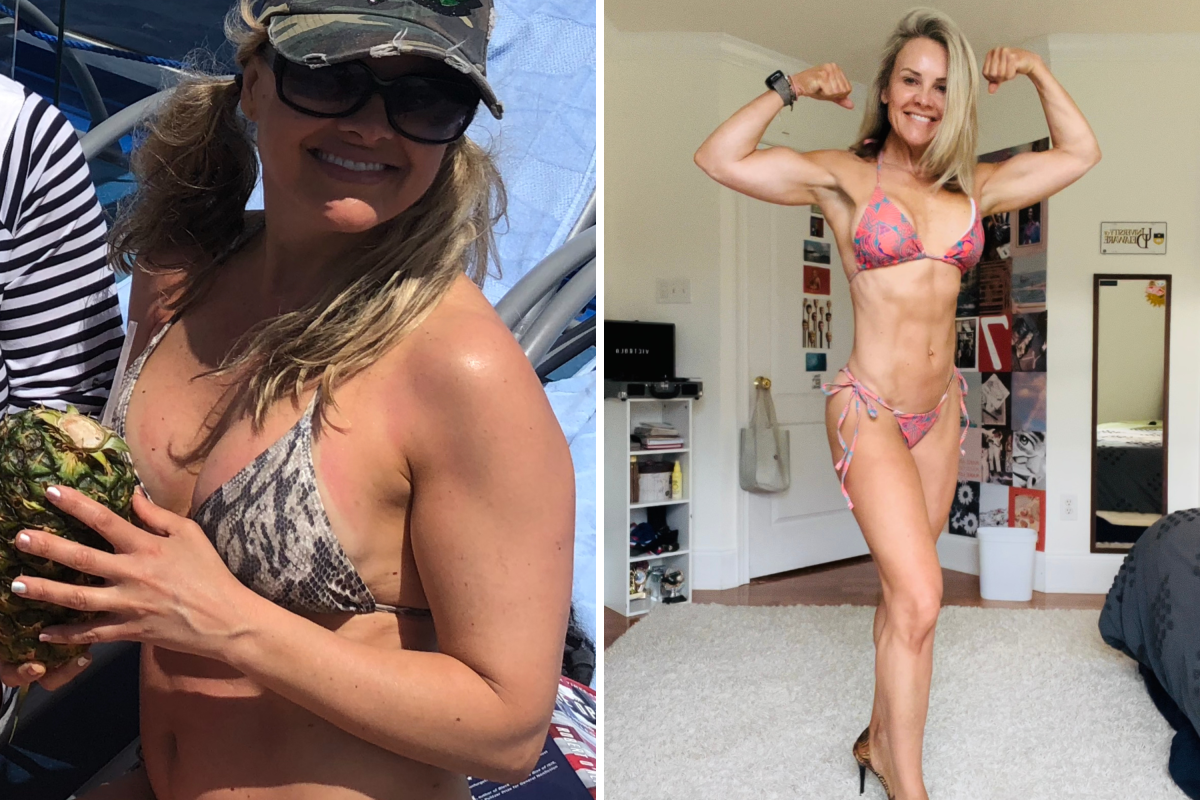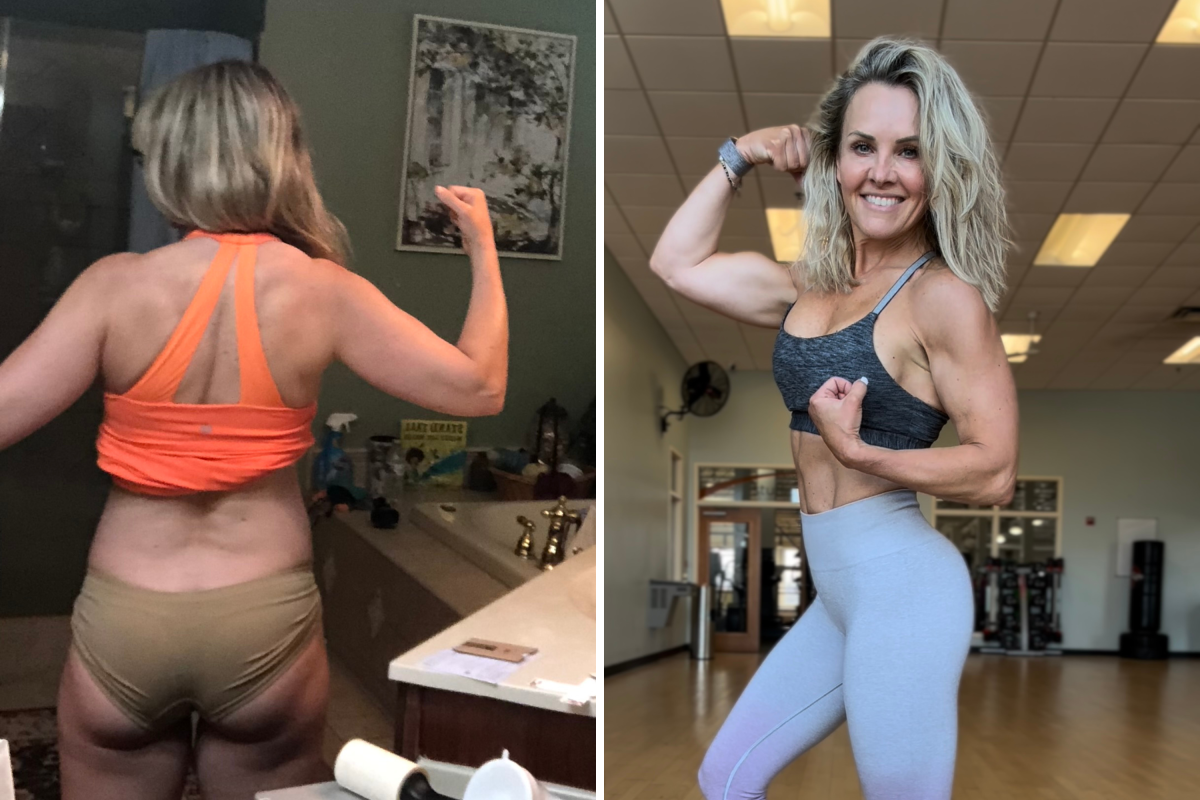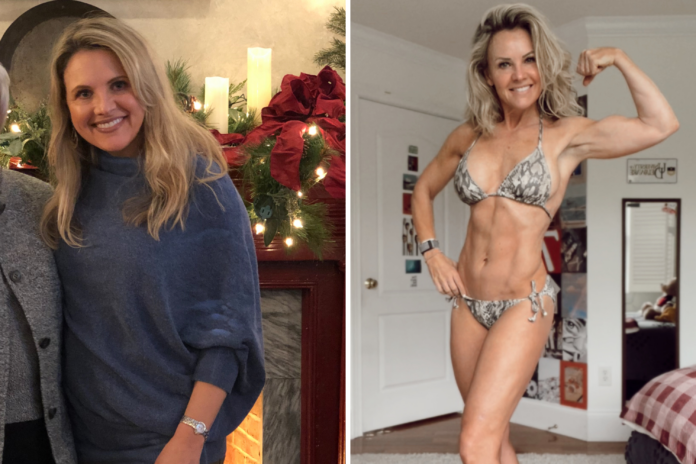Many life events may lead to weight gain and, with age, it can be harder to bounce back. The fitness regimes you once swore by and the diet that helped you shed many pounds may no longer work as your body drastically changes and requires a new routine.
It’s possible for people in the fitness industry to gain weight too, like Jenn Reed. The personal trainer told Newsweek that she “lost her mojo” for most of her forties due to early menopause at age 44.
Reed, from Philadelphia, Pennsylvania, said: “I stopped working out and started eating things I wouldn’t usually eat in quantities that I wouldn’t eat.”
After five years, she gained 25 lbs. At age 49, she decided enough was enough. Reed “forced” herself back into the gym and completely transformed her body by working out less, and eating more.
Jen Reed/Instagram/@thejennreed
Now aged 53, the mom-of-two, who uses the handle @thejennreed, creates content to inspire and empower middle-aged women. She recently racked up 1.3 million views on an Instagram video that showcases pivotal changes she made to her lifestyle.
The clip, captioned “Results don’t happen overnight, but small shifts can lead to big changes [and] sometimes we need to re-evaluate our strategies,” has amassed over 14,200 likes.
“Congratulations you’ve been killing it,” praised one user.
Another said: “Girl you are inspiring.”

Jen Reed/Instagram/@thejennreed
While all of the below points are important elements to her journey, she told Newsweek that focusing less on a smaller waist was the best decision she ever made.
She said: “I stopped trying to lose weight as I realized you don’t need to weigh the least amount to be sexy. It is absurd.
“I stopped trying to get smaller and started growing muscle tissue which is the most beneficial because it’s key for longevity.”
Changes Jenn Reed Made for Body Transformation
The points below were highlighted in the caption of her popular video:
1. “I stopped drinking alcohol because it wasn’t helping me reach my goals.”
Reed’s first step was to eliminate alcohol from her life. Recognizing its hindrance on her path to peak physical condition, she decided that the temporary pleasures of drinking did not align with her long-term health objectives.
2. “I stopped doing box jumps, high knees and tuck jumps between sets and rested 60-120 seconds.”
She told Newsweek: “In my thirties, I would do a set of reps and then squat jumps during my rest time. I wasn’t allowing my body to recover adequately to lift the heavy weight again.
“I had the mentality that more was better. I thought if I worked out at 1,000 mph, I will burn the most calories.
“But to lift heavier, you need to rest.”
3. “I stopped winging my nutrition by just ‘eating clean’, started prioritizing protein [and] tracking my macros.”
Reed began prioritizing protein and meticulously tracking her macros became her new strategy. She now consumes 165 grams of protein per day.
The Recommended Dietary Allowance for protein is 0.8 grams of protein per kilogram of body weight or 0.36 grams per pound. But this is the minimum to avoid getting sick, according to an article published by Harvard Medical School.
To build muscle, one needs between 1.2 – 2.2 grams of protein per kilogram of body weight daily to encourage muscle growth, according to My Protein, a supplement brand.

Jen Reed/Instagram/@thejennreed
4. “I stopped trying to get smaller and started growing muscle tissue.”
She told Newsweek that this was the most beneficial change made.
“Middle aged women need to focus on building muscle,” she said. “Lifting weights isn’t going to make you look like a man or bulky. I am a believer in strong over small.”
Aside from the physical benefits, research has shown that strength training has many advantages. A study published in the British Journal of Sports Medicine, which reviewed data from 16 previous studies involving participants aged 18 to 98, highlighted the significant benefits of strength training for longevity. It found that engaging in muscle-strengthening exercise was associated with a 15 percent lower risk of premature death from all causes. Specifically, 30 to 60 minutes of weight training per week was linked to a 10 to 17 percent lower chance of early death from diseases like diabetes, cancer, and cardiovascular disease.
5. “I stopped training 6-7 days/week and prioritized recovery days.”
Reed focuses on her lower body three days a week and her upper, twice.
“I use the treadmill for 15 to 20 minutes five days per week and I walk my dog daily.
“I don’t count steps but we usually walk for one or 1.5 miles,” she told Newsweek.
“Walking is highly underrated for its ability to burn calories.”
The more sustainable routine has allowed her muscles to heal and grow stronger, highlighting the counterintuitive truth that less can be more in the realm of physical fitness.
6. “I stopped fearing carbohydrates and started increasing them with great results.”
Reed addressed one of the most common fears in diet culture: carbohydrates. Contrary to the popular belief that carbs are the enemy, she increased her carb intake and witnessed remarkable improvements. Carbohydrates, she discovered, were not to be feared but embraced for their role in fueling her workouts and recovery.
“I never restrict myself,” she told Newsweek. “You don’t have to eliminate all of the foods you love.
“I eat three meals per day, one protein shake and another snack.”
She now follows a macro diet focused on carbohydrates, healthy fats, and proteins. The diet is based on individual factors like body composition, age, and health goals, rather than focusing on calorie counting.
While Reed’s workouts may appear effortless in the video, her journey has been far from easy.
She told Newsweek: “As a middle-aged woman, you can’t rely on motivation to take control of your health.”
Is there a health issue that’s worrying you? Let us know via [email protected]. We can ask experts for advice, and your story could be featured on Newsweek.
Uncommon Knowledge
Newsweek is committed to challenging conventional wisdom and finding connections in the search for common ground.
Newsweek is committed to challenging conventional wisdom and finding connections in the search for common ground.


